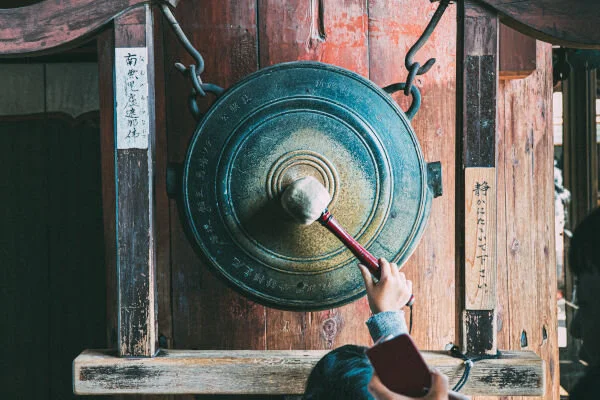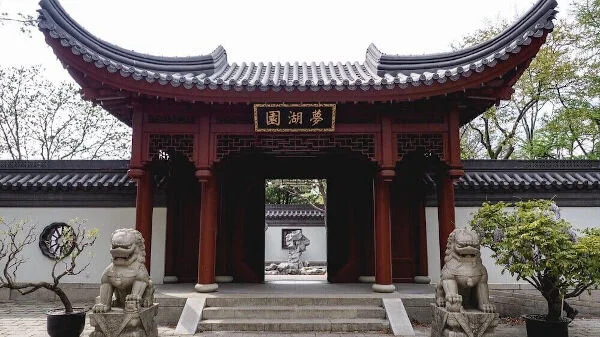Qigong Beginner Tips - Dizziness, nausea, headaches in Qigong?
Can Qigong cause dizziness, nausea or headaches? This article is for the beginner of Qigong who encountered some unexpected, maybe even unpleasant sensations or states of mind and body in their first classes. It is also to tell you: Everything is gonna be okay!
The biggest change happens outside of our comfort zone.
Most people who start a new activity move outside their comfort zone for a while. There are many new impressions and often the body goes through a rather intense process of transformation. If it’s a sport, this will manifest as sore muscles and exhaustion, until the body gets used to the new circumstances. In Qigong and also Taijiquan, you have somewhat similar effects. Of course, there is the physical, too. We begin with aligning our body a certain way and stand in a posture which feels rather awkward in the beginning. However, there are also the physiological and energetic aspects, which relate to many different processes in the body. They play a big role in healing arts such as Qigong but also Tai Chi.
We are not only moving on the superficial muscular level, but also influence these processes and work with different energetic substances such as our Qi. That’s why, especially in the beginning, one might encounter different symptoms and reactions of the body and mind. For example dizziness, nervousness, tremors or nausea. However, there is no need to worry. It is part of the first step, when the body begins to regulate itself.
Tai Chi and Qigong are very profound arts that are, among other things, very effective for body development and self-cultivation. Bringing the training to a high level can be relatively tedious, and requires a lot of dedication, practice, perseverance and discipline. However, especially the beginner can make a lot of progress in a short amount of time. The more refined the body and mind gets, the less obvious it will be for the untrained eye to see this progress. In the beginning it is very quick and obvious though. Through practicing your Qigong exercises, some conditioning and a great deal of relaxation, you will begin to activate the natural inherited healing intelligence of your body and your Qi will begin to sink and to flow freely in an unobstructed manner.
Don’t worry, everything’s gonna be alright.
Some people will experience that their body is overwhelmed at first and has difficulties getting used to the new (inner) environment. In this initial phase of regulation, dizziness, nausea, sore muscles / discomfort, feelings of cold and heat, headaches or other mild symptoms can occur. One of the main reasons for these Qi reactions is tension in the body that has developed due to stress, bad posture or bad habits. Often there is strong tension in the shoulder area or in the whole body, which prevents a balanced flow of energy. This leads to the fact that the Qi is “stuck” in different areas in the body. For example, palpitations can occur when the mind cannot calm down and one is emotionally tense. Other causes could be a tight chest or abnormal breathing. In such cases, the Qi accumulates in the chest area and cannot “drain” away, which in turn causes the heart to pound. Again, there is nothing to worry about. Through conscious relaxation and the gentle focus on the lower abdomen, your Qi can sink again and your state will normalize. In addition, you can place your palms on top of each other on the lower stomach. This brings the Qi back to the center. (Dan Tian)
(Disclaimer) That being said, if you bring some health problems or conditions into practice, obviously it is advisable to chat with your doctor before you start exercising. Naturally, this post is just a guide for you to understanding some of the phenomena and does not serve as your personal medical advice.
Relax body and mind.
Mental tension also affects the body. Those who concentrate excessively or tense certain parts of the body can “confuse” the Qi there. This is often caused by incorrect visualization. Headaches or dizziness can also occur when setting strict goals and you seem desperate to achieve success. This has a direct effect on the body and often these mental tensions also manifest themselves directly in the physical body. It is always best not to have any expectations about the exercise. Things will naturally unfold. The best course of action is always to be very relaxed and gentle, and never to be tense and expectant. Relaxation is the most important aspect that enables our Qi to flow freely and activate the natural healing powers in the body.
In Qigong, a state of calm is sought in which we do not concern ourselves with our thoughts. We just let them come and go. One way to accomplish this is to keep your mind focused on one thing. One should always observe your own body during training and correct its posture, as well as apply the essential principles. We remain gentle and attentive with no strong intention. (Wuwei - non-involvement) This is a very calming, nourishing and positive state of mind. The advantage of this state is that all processes that are stimulated by Qigong in the body take place completely naturally and without being influenced by the conscious and focused mind.
I’m gonna make you sweat.
Another phenomenon that occurs frequently is intense heat that even makes us sweat. Certain exercises lead to the fact that our circulation is activated strongly and the body temperature rises. As long as this warmth is not triggered by tension, uncontrolled breathing or a strong restlessness, it is a good sign. Warmth, or even heat, is a sign of a strong Qi flow. Gradually, the body will continue to regulate itself and a comfortably warm feeling will set in. This can be compared to bathing in warm water. But it can also happen that different extremities feel cold. This is often seen in people who have severe tension in the shoulder area. The muscle tension blocks the flow of Qi and blood to the hands, and they feel cold. Again, there is nothing to worry about. With the conscious relaxation of the corresponding body regions, this blockage can be released again. That being said, it is very useful to practice a variety of stretching exercises in addition to your Qigong practice. This will help to rid yourself of gross chronic tension and allow you to progress quicker.
How about the itch?
Another common phenomenon is itching and tingling. Often this is due to our minds, which are constantly trying to be fed gross superficial stimulation. However, these sensations can also have an energetic origin. They are an effect of the regulation of our Qi and can mean that different processes in the body have already started. Whatever the origin of these sensations, it is important not to scratch yourself. Otherwise our mind has got what it wanted and will try again and again to distract us with such sensations. In addition, we should not interfere directly with the effects of Qi through external stimulation. This would reduce the effect of our exercise. A tingling sensation, slight vibrations, especially in connection with warmth, are very positive sensations and indicate correct cultivation.
Some general advice, the yays and nays.
Qigong creates a connection between humans and nature, especially between human Qi and earth Qi. The different energetic qualities and states always interact and harmonize. (Yin / Yang) It is therefore advisable not to train when a strong imbalance is noticeable in nature. This relates e.g. especially to storms, strong heat waves and warm summer thunderstorms.
If you are very tired or emotionally troubled, you should postpone training so as not to aggravate these conditions. However, an adapted training is possible. For example, those who are able to calm their mental state through meditation can prepare for Qigong training. It is also advisable not to exercise on a completely empty or full stomach. It is advisable to wait at least 60 minutes after a meal. Conversely, you should take some time after training so as not to overwhelm your body. A meal should therefore be eaten no earlier than 30 minutes after the exercise. However, if you want to drink warm water (before, during and after the exercise), you are welcome to do so. This can even increase the effect of our training. If you are sick, you shouldn't stress your body too much. It is advisable to only do light meditation exercises to aid healing. Those who put too much strain on the body through intensive training in the event of illness can mess up the natural healing powers in the body and slow down or even worsen the healing process. So it is better not to get involved “intellectually” and instead just take a break.
Qigong is a very gentle but effective method to strengthen and develop the body from within. It is an ancient art that considers and cultivates the emotional, energetic, mental and physical body as a whole. Through the exercises, we harmonize, among other things, the energy flows and release blockages that disrupt the body's free flow of Qi. The movements are used as a tool to change the quality of our body. We transform the quality of our Qi, we improve our health, body structure, posture, our tissues and fascia, which give us a youthful elasticity and vitality, the whole nervous system, and ultimately change the quality of the whole body and our mind, as well as our whole being and all of our nature. All of these things manifest as we use the exercises as tools to change the inner world of our body. That is the function of Qigong. I would be very happy to accompany you on your own Qigong journey. How about I guide you through the learning process step by step, starting with the foundations and then moving into the more advanced practices? The Yijin Jing Qigong program will do exaclty that. See you on the other side.
I hope this article was useful to you and helped you to continue your practice in a more confident manner. All the very best, stay healthy and well.
Marco Lück (Go to home)





